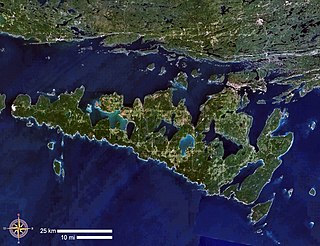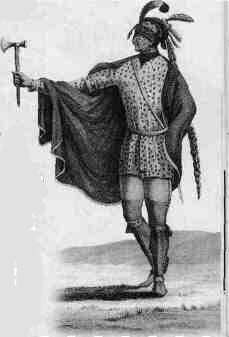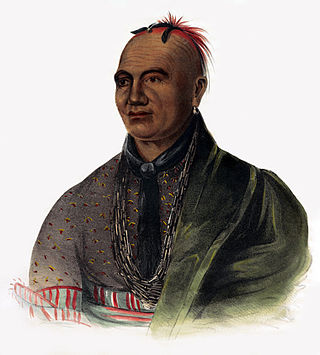Manitou is a general term for spirit beings among many Algonquian Native American groups.
Contents
Manitou or Manitu may also refer to:
Manitou is a general term for spirit beings among many Algonquian Native American groups.
Manitou or Manitu may also refer to:
Longview or Long view may refer to:

Manitoulin Island is an island in Lake Huron, located within the borders of the Canadian province of Ontario, in the bioregion known as Laurentia. With an area of 2,766 km2 (1,068 sq mi), it is the largest lake island in the world, large enough that it has over 100 lakes itself. In addition to the historic Anishinaabe and European settlement of the island, archaeological discoveries at Sheguiandah have demonstrated Paleo-Indian and Archaic cultures dating from 10,000 BC to 2,000 BC.

The Illinois Confederation, also referred to as the Illiniwek or Illini, were made up of 12 to 13 tribes who lived in the Mississippi River Valley. Eventually member tribes occupied an area reaching from Lake Michicigao (Michigan) to Iowa, Illinois, Missouri, and Arkansas. The five main tribes were the Cahokia, Kaskaskia, Michigamea, Peoria, and Tamaroa. The name of the confederation was derived from the transliteration by French explorers of iliniwe to Illinois, more in keeping with the sounds of their own language. The tribes are estimated to have had tens of thousands of members, before the advancement of European contact in the 17th century that inhibited their growth and resulted in a marked decline in population.
Algonquin or Algonquian—and the variation Algonki(a)n—may refer to:

The American Locomotive Company was an American manufacturer of locomotives, diesel generators, steel, and tanks that operated from 1901 to 1969.

Sleeping Bear Dunes National Lakeshore is a United States National Lakeshore located along the northwest coast of the Lower Peninsula of Michigan in Leelanau and Benzie counties near Empire, Michigan. The park covers a 35-mile-long (56 km) stretch of Lake Michigan's eastern coastline, as well as North and South Manitou islands. This Northern Michigan park was established primarily because of its outstanding natural features, including forests, beaches, dune formations, and ancient glacial phenomena. The lakeshore also contains many cultural features including the 1871 South Manitou Island Lighthouse, three former stations of the Coast Guard and an extensive rural historic farm district. In 2011, the area won the title of "The Most Beautiful Place in America" from Good Morning America. In 2014, a section of the park was named the Sleeping Bear Dunes Wilderness by the United States Congress.

Doppelmayr USA, Inc is an aerial lift manufacturer based in Salt Lake City, Utah, and a subsidiary of the worldwide Doppelmayr Garaventa Group. The United States company was formed in 2002 after the merger of Garaventa of Goldau, Switzerland, and Doppelmayr of Wolfurt, Austria. Between 2002 and 2010, the company was named Doppelmayr CTEC. From 2011 the company has operated using the Doppelmayr brand name, in common with most other Doppelmayr Garaventa Group subsidiaries.
Samuel de Champlain (1574–1635) was a French explorer.
The "Huron Carol" is a Canadian Christmas hymn, written probably in 1642 by Jean de Brébeuf, a Jesuit missionary at Sainte-Marie among the Hurons in Canada. Brébeuf wrote the lyrics in the native language of the Huron/Wendat people; the song's original Huron title is "Jesous Ahatonhia". The song's melody is based on a traditional French folk song, "Une Jeune Pucelle". The well-known English lyrics were written in 1926 by Jesse Edgar Middleton and the copyright to these lyrics was held by The Frederick Harris Music Co., Limited, but entered the public domain in 2011.
Spirit of God may refer to:

The Great Spirit is the concept of a life force, a Supreme Being or god known more specifically as Wakan Tanka in Lakota, Gitche Manitou in Algonquian, and by other, specific names in a number of Native American and First Nations cultures. While the concept is common to a number of indigenous cultures in the United States and Canada, it is not shared by all cultures, or necessarily interpreted in the same way. According to Lakota activist Russell Means, a more semantically accurate translation of Wakan Tanka is the Great Mystery.

Gitche Manitou means "Great Spirit" in several Algonquian languages. Christian missionaries have translated God as Gitche Manitou in scriptures and prayers in the Algonquian languages.

Indigenous peoples of the Northeastern Woodlands include Native American tribes and First Nation bands residing in or originating from a cultural area encompassing the northeastern and Midwest United States and southeastern Canada. It is part of a broader grouping known as the Eastern Woodlands. The Northeastern Woodlands is divided into three major areas: the Coastal, Saint Lawrence Lowlands, and Great Lakes-Riverine zones.
Carlson may refer to:

Leitner-Poma of America, known simply as Leitner-Poma, is a United States aerial lift manufacturer based in Grand Junction, Colorado. It is the American subsidiary of French-based Poma, which is owned by the Italian company HTI Group. The North American company was formed in 2000 when the Seeber Group, owner of Leitner, bought Poma and merged both companies' North American subsidiaries. Leitner-Poma of America operates a Canadian subsidiary based in Barrie, Ontario called Leitner-Poma Canada Inc.

Manitou, akin to the Haudenosaunee orenda, is the spiritual and fundamental life force among Algonquian groups in the Native American theology. It is omnipresent and manifests everywhere: organisms, the environment, events, etc. Aashaa monetoo means "good spirit," while otshee monetoo means "bad spirit." When the world was created, the Great Spirit, Aasha Monetoo, gave the land to the indigenous peoples, the Shawnee in particular.
Russell may refer to:
The Mohegan are an ethnic group of Connecticut, United States.
Ford commonly refers to:
Great Spirit may refer to: